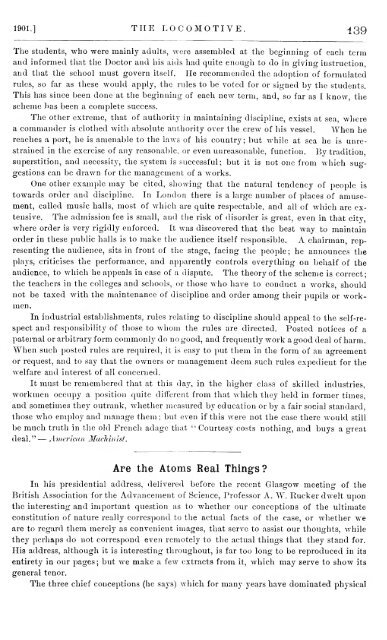The Locomotive - Lighthouse Survival Blog
The Locomotive - Lighthouse Survival Blog
The Locomotive - Lighthouse Survival Blog
Create successful ePaper yourself
Turn your PDF publications into a flip-book with our unique Google optimized e-Paper software.
1901.] THE LOCOMOTIVE. 139<br />
<strong>The</strong> students, who were mainly adults, were assembled at the beginning of each term<br />
and informed that the Doctor and his aids had quite enough to do in giving instruction,<br />
and that the school must govern itself. He recommended the adoption of formulated<br />
rules, so far as these would apply, the rules to be voted for or signed by the students.<br />
This has since been done at the beginning of each new term, and, so far as I know, the<br />
scheme has been a complete success.<br />
<strong>The</strong> other extreme, that of authority in maintaining discipline, exists at sea, where<br />
a commander is clothed with absolute authority over the crew of his vessel. When he<br />
reaches a port, he is amenable to the laws of his country; but while at sea he is unre-<br />
strained in the exercise of any reasonable, or even unreasonable, function. By tradition,<br />
superstition, and necessity, the system is successful; but it is not one from which suggestions<br />
can be drawn for the management of a works.<br />
One other example may be cited, showing that the natural tendency of people is<br />
towards order and discipline. In London there is a large number of places of amuse-<br />
ment, called music halls, most of which are quite respectable, and all of which are ex-<br />
tensive. <strong>The</strong> admission fee is small, and the risk of disorder is great, even in that city,<br />
where order is very rigidly enforced. It was discovered that the best way to maintain<br />
order in these public halls is to make the audience itself responsible. A chairman, rep-<br />
resenting the audience, sits in front of the stage, facing the people; he announces the<br />
plays, criticises the performance, and apparently controls everything on behalf of the<br />
audience, to which he appeals in case of a dispute. <strong>The</strong> theory of the scheme is correct;<br />
the teachers in the colleges and schools, or those who have to conduct a works, should<br />
not be taxed with the maintenance of discipline and order among their pupils or workmen.<br />
In industrial establishments, rules relating to discipline should appeal to the self-re-<br />
spect and responsibility of those to whom the rules are directed. Posted notices of a<br />
paternal or arbitrary form commonly do no good, and frequently work a good deal of harm.<br />
When such posted rules are required, it is easy to put them in the form of an agreement<br />
or request, and to say that the owners or management deem such rules expedient for the<br />
welfare and interest of all concerned.<br />
It must be remembered that at this day, in the higher class of skilled industries,<br />
workmen occupy a position quite different from that which they held in former times,<br />
and sometimes they outrank, whether measured by education or by a fair social standard,<br />
those who employ and manage them ;<br />
but even if this were not the case there would still<br />
be much truth in the old French adage that " Courtesy costs nothing, and buys a great<br />
deal. " — American Machinist.<br />
Are the Atoms Real Things?<br />
In his presidential address, delivered before the recent Glasgow meeting of the<br />
British Association for the Advancement of Science, Professor A. W. Rucker dwelt upon<br />
the interesting and important question as to whether our conceptions of the ultimate<br />
constitution of nature really correspond to the actual facts of the case, or whether we<br />
are to regard them merely as convenient images, that serve to assist our thoughts, while<br />
they perhaps do not correspond even remotely to the actual things that they stand for.<br />
His address, although it is interesting throughout, is far too long to be reproduced in its<br />
entirety in our pages; but we make a few extracts from it, which may serve to show its<br />
general tenor.<br />
<strong>The</strong> three chief conceptions (he says) which for many years have dominated physical
















